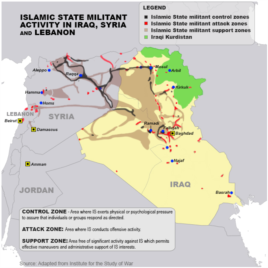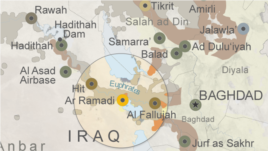Senior U.S. officials on Sunday questioned the will of Iraqi forces in the ongoing battle against Islamic State militants, drawing a sharp response from Baghdad and fresh criticism in Washington about President Barack Obama’s strategy to defeat the group.
The comments come a week after Islamic State fighters seized Ramadi in an offensive that sent Iraqi security forces fleeing the city 125 kilometers west of the capital, Baghdad, and leaving U.S.-supplied weapons and equipment behind.
U.S. Defense Secretary Ash Carter criticized the Iraqi forces in an interview with CNN, calling their actions “very concerning.”
“What apparently happened is the Iraqi forces just showed no will to fight. They were not outnumbered,” Carter said. “In fact, they vastly outnumbered the opposing force. That says to me, and I think to most of us, that we have an issue with the will of the Iraqis to fight ISIL and defend themselves.”
National Security Advisor Susan Rice echoed Carter’s concerns in an interview on CBS.
“Iraqi security forces face their own internal challenges… It’s an uneven force in terms of will, equipment and leadership,” Rice said, adding that the United States is working with them to address what she categorized as “weaknesses.”
Shortly after the interviews aired, the head of the Iraqi parliament’s defense and security committee, Hakim al-Zamili, told the Associated Press that Carter’s comments are “unrealistic and baseless.” He said the United States is trying to shift blame to Iraq for Washington’s failure to provide “good equipment, weapons and aerial support” to Iraqi forces.
Last week, Obama told The Atlantic magazine that he did not think Iraq and the U.S.-led coalition were losing, calling the seizure of Ramadi a “tactical setback.” He said Iraqi forces in Anbar province are not being trained fast enough.
U.S. Senator John McCain, who chairs the Senate’s Foreign Relations Committee, however said Sunday that it is apparent “there is no strategy” for combating the militants.
Coalition warplanes have carried out more than 4,000 airstrikes targeting the Islamic State group in Iraq and Syria since launching their campaign in August. Obama has sent military advisers to aid Iraqi troops, but has shown no public desire to deploy American ground forces.
The bombings continued Sunday with 11 airstrikes in Syria and 17 in Iraq, according to the Pentagon. Those included some in Ramadi, which the Pentagon said destroyed 19 armored vehicles, although it was not clear if that equipment was among the items Iraqi forces left behind.
VOA’s Victoria Macchi interviews Alhurra TV news director Rafal Mahdi
“Security forces supported by tribal fighters still remain in [those] cities, but with weak capabilities when compared to ISIS, [which] has secured weapons and military vehicles left by the retreating army forces and police,” Mahdi said.
As IS moved into Ramadi in the last 10 days, Anbar provincial officials and tribal sources told VOA’s Kurdish service they believe the response from the central government on the newest frontline against Islamic State was slow to arrive.
Marina Ottaway, a senior scholar with the Woodrow Wilson Center’s Middle East Center, described Iraq’s military as well-trained and robust, but lacking morale.
“They’re better trained than anybody else, and they have much larger numbers than anybody else,” Ottaway said, but “they don’t know what they are fighting for, or they are poorly led.”































